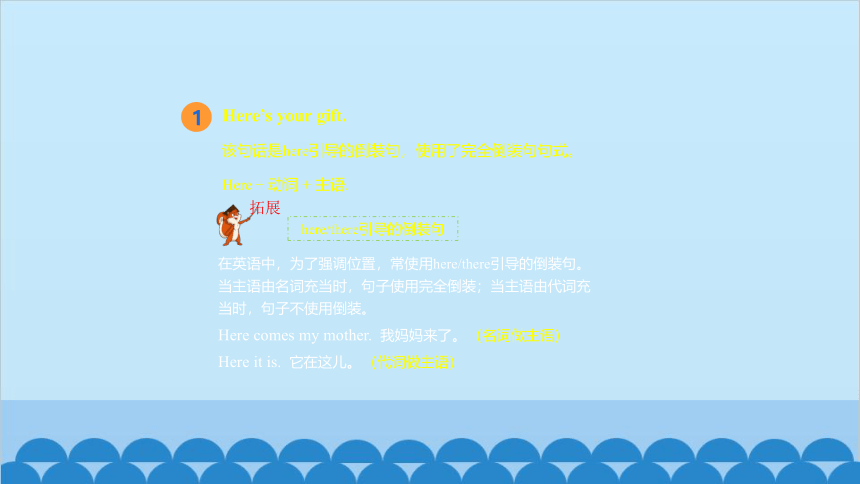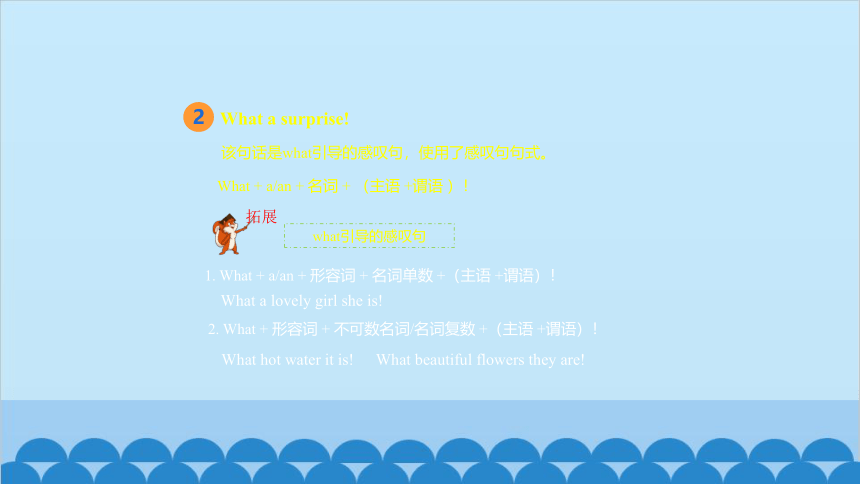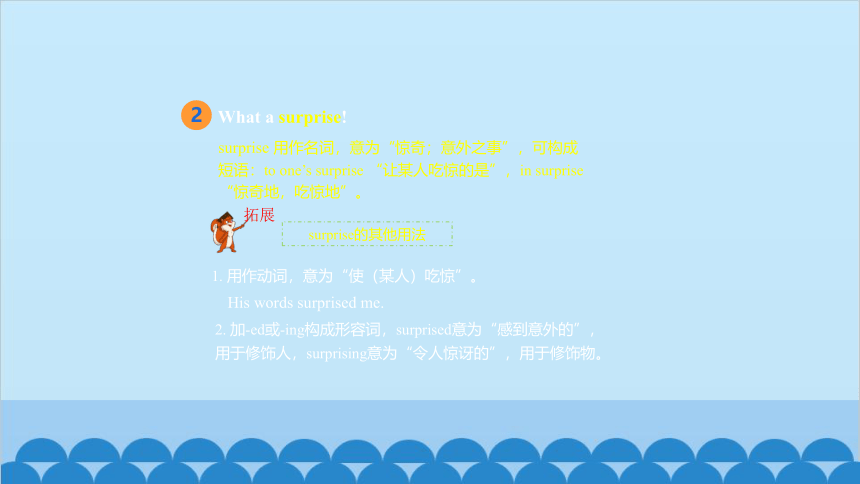外研版英语八年级上册 Module 11 Unit 1 In China ,we open a gift later.课件(11张PPT)
文档属性
| 名称 | 外研版英语八年级上册 Module 11 Unit 1 In China ,we open a gift later.课件(11张PPT) |

|
|
| 格式 | pptx | ||
| 文件大小 | 268.2KB | ||
| 资源类型 | 教案 | ||
| 版本资源 | 外研版 | ||
| 科目 | 英语 | ||
| 更新时间 | 2023-08-17 07:34:57 | ||
图片预览





文档简介
(共11张PPT)
Module 11
Unit 1 In China, we open a gift later.
Here’s your gift.
1
该句话是here引导的倒装句,使用了完全倒装句句式。
Here + 动词 + 主语.
here/there引导的倒装句
拓展
在英语中,为了强调位置,常使用here/there引导的倒装句。当主语由名词充当时,句子使用完全倒装;当主语由代词充当时,句子不使用倒装。
Here it is. 它在这儿。(代词做主语)
Here comes my mother. 我妈妈来了。(名词做主语)
What a surprise!
2
该句话是what引导的感叹句,使用了感叹句句式。
What + a/an + 名词 + (主语 +谓语 )!
what引导的感叹句
拓展
1. What + a/an + 形容词 + 名词单数 +(主语 +谓语)!
What a lovely girl she is!
2. What + 形容词 + 不可数名词/名词复数 +(主语 +谓语)!
What hot water it is!
What beautiful flowers they are!
What a surprise!
2
surprise 用作名词,意为“惊奇;意外之事”,可构成短语:to one’s surprise “让某人吃惊的是”,in surprise “惊奇地,吃惊地”。
surprise的其他用法
拓展
1. 用作动词,意为“使(某人)吃惊”。
His words surprised me.
2. 加-ed或-ing构成形容词,surprised意为“感到意外的”,用于修饰人,surprising意为“令人惊讶的”,用于修饰物。
I don’t think I should open it now.
3
该句话使用了否定前置,当I think引导的宾语从句是否定句时,通常将否定转移到主句的位置上,我们称之为否定前置或否定前移。
适用于否定前移的情况
拓展
在含有宾语从句的复合句中,如果主句的谓语动词是believe,suppose,think等,主句的人称是第一人称,时态是一般现在时,从句的否定词就可以前移到主句。
( )I _______ believe you ________ right.
A. don’t; are
B. /; aren’t
C. doesn’t; aren’t
D. doesn’t; are
选一选
A
In China, you accept a gift with both hands.
4
accept 用作及物动词,意为“收受;接受”,后接名词或代词做宾语。
accept 和 receive 的区别
辨析
accept 表示主观上经过考虑,愿意接受。
receive 表示客观上“收到”,不包含主观上是否接受的意思。
For example, in my home town, people say you mustn’t do any cleaning on the first day of the Spring Festival.
5
for example 意为“例如”,一般只以同类人或事物中的 一个为例,可在句中做插入语,用逗号与前后隔开,也可置于句首或句末。
For example, he is very lovely.
He, for example, is very lovely.
He is very lovely, for example.
And you’d better not have your hair cut during the Spring Festival month.
6
You’d better not do sth. “你最好不要做某事。”
肯定句形式为:You’d better do sth. “你最好做某事。”
have your hair cut 用作固定搭配,意为“(让别人给你)理发”,cut是过去分词形式。在英语中“have + 宾语 + 过去分词 ” 表示“让某人做某事”,宾语和宾语补足语是逻辑上的动宾关系,宾语补足语所表示的动作常由他人(非主语本身)来完成,因而含有被动意义。
He wants to have the meat eaten.
They taste great.
7
taste 用作感官系动词,意为“尝起来;有……的味道”,后接形容词做表语。
常见的感官系动词
拓展
look 看起来
smell 闻起来
taste 尝起来
sound 听起来
feel 摸起来;感觉起来
课堂小结
1. 三个单词:surprise, accept, taste
2. 两个短语:for example,
have + 宾语 + 过去分词
3. 四个句式: here引导的倒装句,what引导的感叹句,I think …的否定句,You’d better not do sth.
Module 11
Unit 1 In China, we open a gift later.
Here’s your gift.
1
该句话是here引导的倒装句,使用了完全倒装句句式。
Here + 动词 + 主语.
here/there引导的倒装句
拓展
在英语中,为了强调位置,常使用here/there引导的倒装句。当主语由名词充当时,句子使用完全倒装;当主语由代词充当时,句子不使用倒装。
Here it is. 它在这儿。(代词做主语)
Here comes my mother. 我妈妈来了。(名词做主语)
What a surprise!
2
该句话是what引导的感叹句,使用了感叹句句式。
What + a/an + 名词 + (主语 +谓语 )!
what引导的感叹句
拓展
1. What + a/an + 形容词 + 名词单数 +(主语 +谓语)!
What a lovely girl she is!
2. What + 形容词 + 不可数名词/名词复数 +(主语 +谓语)!
What hot water it is!
What beautiful flowers they are!
What a surprise!
2
surprise 用作名词,意为“惊奇;意外之事”,可构成短语:to one’s surprise “让某人吃惊的是”,in surprise “惊奇地,吃惊地”。
surprise的其他用法
拓展
1. 用作动词,意为“使(某人)吃惊”。
His words surprised me.
2. 加-ed或-ing构成形容词,surprised意为“感到意外的”,用于修饰人,surprising意为“令人惊讶的”,用于修饰物。
I don’t think I should open it now.
3
该句话使用了否定前置,当I think引导的宾语从句是否定句时,通常将否定转移到主句的位置上,我们称之为否定前置或否定前移。
适用于否定前移的情况
拓展
在含有宾语从句的复合句中,如果主句的谓语动词是believe,suppose,think等,主句的人称是第一人称,时态是一般现在时,从句的否定词就可以前移到主句。
( )I _______ believe you ________ right.
A. don’t; are
B. /; aren’t
C. doesn’t; aren’t
D. doesn’t; are
选一选
A
In China, you accept a gift with both hands.
4
accept 用作及物动词,意为“收受;接受”,后接名词或代词做宾语。
accept 和 receive 的区别
辨析
accept 表示主观上经过考虑,愿意接受。
receive 表示客观上“收到”,不包含主观上是否接受的意思。
For example, in my home town, people say you mustn’t do any cleaning on the first day of the Spring Festival.
5
for example 意为“例如”,一般只以同类人或事物中的 一个为例,可在句中做插入语,用逗号与前后隔开,也可置于句首或句末。
For example, he is very lovely.
He, for example, is very lovely.
He is very lovely, for example.
And you’d better not have your hair cut during the Spring Festival month.
6
You’d better not do sth. “你最好不要做某事。”
肯定句形式为:You’d better do sth. “你最好做某事。”
have your hair cut 用作固定搭配,意为“(让别人给你)理发”,cut是过去分词形式。在英语中“have + 宾语 + 过去分词 ” 表示“让某人做某事”,宾语和宾语补足语是逻辑上的动宾关系,宾语补足语所表示的动作常由他人(非主语本身)来完成,因而含有被动意义。
He wants to have the meat eaten.
They taste great.
7
taste 用作感官系动词,意为“尝起来;有……的味道”,后接形容词做表语。
常见的感官系动词
拓展
look 看起来
smell 闻起来
taste 尝起来
sound 听起来
feel 摸起来;感觉起来
课堂小结
1. 三个单词:surprise, accept, taste
2. 两个短语:for example,
have + 宾语 + 过去分词
3. 四个句式: here引导的倒装句,what引导的感叹句,I think …的否定句,You’d better not do sth.
同课章节目录
- Module 1 How to learn English
- Unit 1 Let's try to speak English as much as possi
- Unit 2 You should smile at her.
- Unit 3 Language in use .
- Module 2 My home town and my country
- Unit 1 It's taller than many other buildings.
- Unit 2 Cambridge is a beautiful city in the east o
- Unit 3 Language in use .
- Module 3 Sports.
- Unit 1 Nothing is more exciting than playing tenni
- Unit 2 This year we training more carefully.
- Unit 3 Language in use .
- Module 4 Planes, ships and trains .
- Unit 1 He lives the farthest from school.
- Unit 2 What is the best way to travel.
- Unit 3 Language in use .
- Module 5 Lao She Teahouse.
- Unit 1 I wanted to see the Beijing Opera.
- Unit 2 It descibes the changes in Chinese society.
- Unit 3 Language in use .
- Module 6 Animals in danger.
- Unit 1 It allows people to get closer to them .
- Unit 2 The WWF is working hard to save them all.
- Unit 3 Language in use .
- Revision module A
- Module 7 A famous story
- Unit 1 Alice was sitting with her sister by the ri
- Unit 2 She was thinking about her cat.
- Unit 3 Language in use .
- Module 8 Accidents
- Unit 1 While the car were changing to red, a car s
- Unit 2 I was trying to pick it up when it bite me
- Unit 3 Language in use .
- Module 9 Population
- Unit 1 The population of China is about 1.37 billi
- Unit 2 Arnwick was a city with 200,000 people.
- Unit 3 Language in use .
- Module 10 The weathe
- Unit 1 It might snow.
- Unit 2 The weather is fine all year round.
- Unit 3 Language in use .
- Module 11 Way of life
- Unit 1 In China ,we open a gift later.
- Unit 2 In England, you usually drink tea with milk
- Unit 3 Language in use .
- Module 12 Help
- Unit 1 What should we do before help arrives?
- Unit 2 Stay away from windows and heavy furniture.
- Unit 3 Language in use .
- Revision module B
